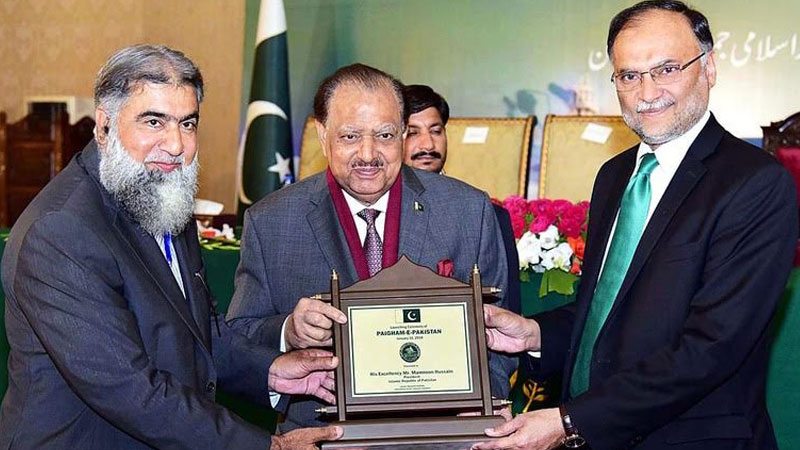Pakistan has been a front line state in the conflict to get rid of terrorism and extremism in the region for the final 16 years.
Though Pakistan has lost so much in the war on terror, it has also comparatively achieved so much. If compared to other countries that are fighting terrorists in Afghanistan, Pakistan has done an enourmous work; it has broken the bone of terrorism.
This becomes abundantly clear if we compare the number of terrorist acts committed in 2007, with the gradual decrease of the incidents in subsequent years till now, when terrorist hideouts from Waziristan have been eliminated, although some terrorists have escaped and got refuge in Afghanistan. Now that much harm has been done to terrorists, terror attacks occur occassionaly and only when a terrorist finds an opportunity ti cross into Pakistan from Afghanistan. Most of them hide in the Afghan Muhajareen camps.
It can be said with a lot of confidence that the correct implementation of NAP, duly supported by this Fatwa would enable Pakistan to shun the forces of extremism and terrorism and focus on economic development based on the incentives related to the China-Pakistan Economic Corridor. This will achieve prosperity and economic well being for the people
The elimination of terrorists’ capacity to conduct attacks has not come easily and in a short time. In this context Pakistan had to adopt hard and soft approaches simultaneously. While Pakistan’s military had launched a series of operations at different stages in Swat, South Waziristan and North Waziristan, at the same time Pakistan was using soft approaches to change terrorists and their follower mindset. The soft measures were supported by the fatwas issued by some eminent Ulemas, stating that violence and terrorism were forbidden in Islam.
After a terrorist attack on Peshawar APS on December 2014, along with launching operation Zarb-I-Azb in North Waziristan, Pakistan also adopted a 20 Points National Action Plan (NAP) for implementation to completely eliminate the terrorism and extremism. In this regard while Zarb-I- Azb was a great success in eliminating terrorist hideouts in North Waziristan, implementation of the NAP also helped in some ways. For future vigilance, the ongoing operation Radd-UL-Fassad is continuing. After achieving such a remarkable success in ending terrorism, it was felt by the Pakistan government that to end extremist tendencies, leading to terrorism, it was necessary to make a long term plan to reinforce the implementation of the NAP.
In the context of supporting the implementation of NAP, in January 2018, Pakistani Ulemas have made a major contribution to end terrorism and extremism by issuing a joint fatwa, named Paigham-I-Pakistan. According to the Herald, dated 22 January, 2018, in the second week of January 2018, during a ceremony, where President of Pakistan was the chief guest, the government of Pakistan announced the ‘Paigham-I-Pakistan’, a unanimous fatwa (Islamic ruling), signed by over 1,800 religious clerics from different schools of thought. The ruling states that those who commit suicide attacks, order such attacks, train such people are all considered rebels against the true spirit of Islam. Many verses from the Quran have been quoted to illustrate punishments for those who create chaos on earth.
The ruling further states that no one, in any capacity, would be allowed to either give a call for the imposition of Shariah or announce the existing governing setup contrary to Islam. It further says that any disagreement among different sects leading to hate speech and sectarian violence would be considered anarchic and punished accordingly. No individual, the document declares, can take the law into his/her hand on the pretext of blasphemy, and only the state can ascertain if an act of blasphemy has been carried or not. The responsibility to enforce the Paigham-e-Pakistan is laid on three entities: the academic/religious institutions, the government institutions, and the mosques. The government institutions are also guided to treat the people of Pakistan with respect and provide equal opportunities for them and fundamental rights as enshrined in Pakistan’s constitution.
Addressing the ceremony, President Mamnoon Hussain expressed confidence that the “Issuing a fatwa drafted by means of a consultative process is a step in the right direction. And it would portray a soft and positive image of Pakistan, and also, highlight Islam as a religion of peace, brotherhood, tolerance and accommodation.”
In view of the above it is considered that the above stated fatwa will create a lasting impact on proper implementation of NAP and ending tendencies of extremism and terrorism in the country. In this context the fatwa is a major step forward as this indicates that Pakistani nation is united in ending the menace of extremism and terrorism. The fatwa also proves that all religious sects want that in Pakistan, Islam as a religion should not be misinterpreted and it should be correctly understood. In this context, it can be said with a lot of confidence that the correct implementation of the NAP, duly supported by this fatwa would enable Pakistan to shun the forces of extremism and terrorism and focus on sites’ economic development based on the incentives related to the China-Pakistan Economic Corridor (CPEC) to achieve prosperity and economic well being of its people.
The writer is an ex Army officer and a former Research Fellw, Islamabad Policy Research Institute (IPRI), Islamabad]
Published in Daily Times, March 12th 2018.

